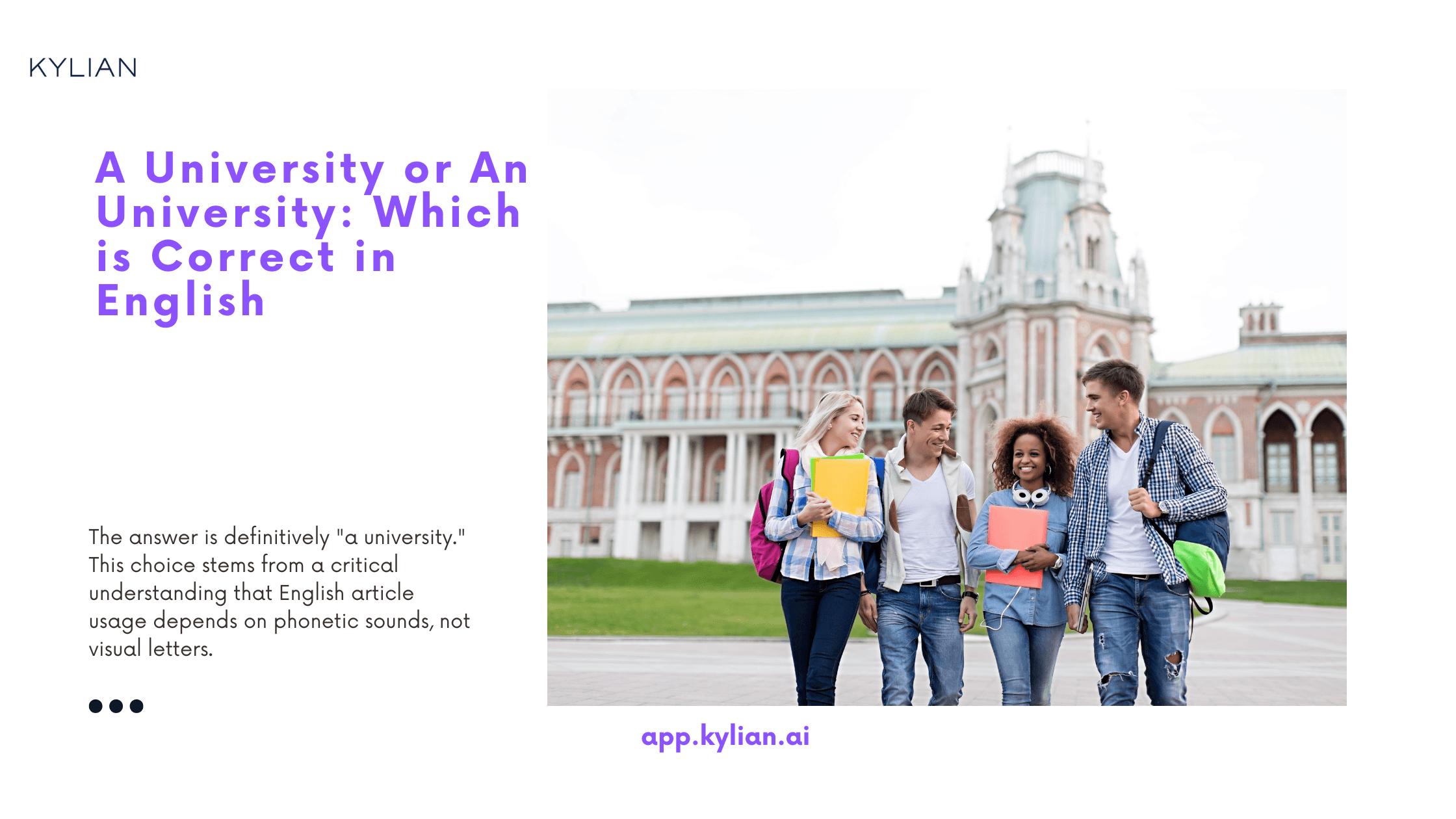

A University or An University: Which is Correct in English
The English language presents countless grammatical puzzles that trip up both native speakers and learners alike. Among these, the choice between "a university" and "an university" represents a perfect case study in why surface-level rules often mislead us. This distinction matters because it reveals a fundamental principle of English grammar that extends far beyond this single example. The answer is definitively "a university." This choice stems from a critical understanding that English article usage depends on phonetic sounds, not visual letters. When we say "university," we pronounce it as "yoo-ni-ver-si-ty," beginning with a consonant sound despite the vowel letter 'u' at the start.
![How to Use Big Talk for Meaningful Relationships [English]](/_next/image?url=https%3A%2F%2Fcdn.sanity.io%2Fimages%2F147z5m2d%2Fproduction%2F7ef3a2b4edbb0a4da61fda559d6d27e61ed0f109-2240x1260.png&w=3840&q=75)

How to Use Big Talk for Meaningful Relationships [English]
Surface-level conversations are killing our relationships. The endless cycle of "How was your weekend?" and "Nice weather today" creates an illusion of connection while leaving us fundamentally isolated from the people who matter most. Research from Harvard Business School demonstrates that people who engage in substantive conversations report 12% higher relationship satisfaction compared to those who stick to conventional small talk. Yet most of us remain trapped in conversational patterns that prevent genuine intimacy and understanding. The cost of this superficial communication extends beyond personal discomfort. Big talk conversations represent a fundamental shift toward intentional dialogue that builds lasting emotional bonds. This approach doesn't just improve relationships—it transforms them by creating space for vulnerability, understanding, and authentic connection.


17 Best Apps to Learn English: Get Fluent (2025)
Language acquisition has fundamentally shifted from classroom-bound instruction to pocket-sized solutions that deliver results. The proliferation of English learning applications has created an unprecedented opportunity for learners worldwide, yet the abundance of choices often leads to decision paralysis rather than progress. The data tells a compelling story: mobile language learning users spend an average of 15 minutes per session, with retention rates 67% higher than traditional classroom methods when apps are used consistently over 90 days. What matters now isn't whether apps can facilitate English learning—it's which ones deliver measurable fluency gains and justify your investment of time and attention. This analysis examines 16 English learning applications through the lens of pedagogical effectiveness, technological innovation, and real-world application. Each recommendation addresses specific learning objectives, from pronunciation refinement to conversational fluency, enabling you to construct a targeted learning strategy rather than adopting a one-size-fits-all approach.


20 German Tongue Twisters to Master Pronunciation
German pronunciation presents unique challenges that demand systematic practice. While traditional language learning focuses on vocabulary and grammar, pronunciation mastery requires targeted exercises that train muscle memory and phonetic precision. German tongue twisters—known as Zungenbrecher—serve as diagnostic tools and training mechanisms for the most problematic sound combinations in the language. The strategic value of tongue twisters extends beyond entertainment. They isolate specific phonetic challenges, force rapid articulation adjustments, and build confidence in sound production. For German learners, this targeted practice addresses the language's notorious consonant clusters, vowel distinctions, and rhythm patterns that separate intermediate speakers from advanced ones.


40 Most Memorable British Slang Words ESL Learners Need
Mastering British slang represents a critical milestone for ESL learners seeking authentic communication with native speakers. Unlike textbook English, slang forms the backbone of genuine British conversation, creating bridges between formal language instruction and real-world linguistic competency. British slang operates as more than casual vocabulary—it functions as cultural currency. Each term carries centuries of social evolution, regional identity, and generational wisdom compressed into accessible expressions. For ESL learners, understanding these terms transforms mechanical language use into natural, contextually appropriate communication. The data supports this necessity. Research indicates that native speakers incorporate slang into approximately 60% of informal conversations, making comprehension essential for meaningful social and professional integration. Without this knowledge, ESL learners miss critical communication layers, potentially misinterpreting tone, intent, and social dynamics. This comprehensive guide examines 40 essential British slang terms, organized by usage context and frequency. Each entry provides etymological background, practical applications, and strategic implementation advice for ESL learners pursuing linguistic authenticity.


11 Real Spanish Conversation Practice Methods
The gap between understanding Spanish and actually speaking it fluently represents one of the most significant challenges in language acquisition. Research from the Modern Language Association indicates that 73% of language learners struggle with the transition from passive comprehension to active conversation skills. This disparity exists because traditional learning methods emphasize vocabulary memorization and grammar rules while neglecting the spontaneous, real-time processing required for authentic communication. Spanish conversation practice isn't optional—it's the bridge that transforms theoretical knowledge into practical fluency. The neurological pathways activated during live conversation differ fundamentally from those used in reading or listening exercises. When you engage in real-time Spanish dialogue, your brain simultaneously processes incoming audio, formulates responses, and manages pronunciation—a complex cognitive orchestra that can only be developed through consistent practice. What follows are nine evidence-based strategies for developing genuine Spanish conversational competence. Each method addresses specific aspects of spoken communication, from reducing anxiety around conversation initiation to building the confidence necessary for sustained dialogue with native speakers.
![What is the meaning of fine and dandy? [English]](/_next/image?url=https%3A%2F%2Fcdn.sanity.io%2Fimages%2F147z5m2d%2Fproduction%2Ff51d7eced94ed1b5d210a41383586786a1582e70-2240x1260.png&w=3840&q=75)

What is the meaning of fine and dandy? [English]
Language operates on multiple layers of meaning, and idioms represent one of the most fascinating linguistic phenomena where surface-level words diverge dramatically from intended communication. The phrase "fine and dandy" exemplifies this complexity, functioning as a linguistic chameleon that shifts meaning based on context, tone, and cultural understanding.


America's Favorite Love Songs Revealed by State Analysis
Music serves as society's emotional barometer, and nowhere is this more evident than in how Americans consume love and breakup songs. Recent data analysis of search patterns and playlist behaviors across all 50 states reveals striking regional preferences that challenge conventional assumptions about musical taste and romantic expression. The findings matter now because streaming platforms have fundamentally altered how we discover and consume emotional music. Unlike previous generations who relied on radio programming or physical album purchases, today's listeners actively search for songs that match their emotional states. This behavioral shift creates unprecedented data trails that reveal authentic preferences rather than industry-manufactured hits.


How Should 'A Lot' Be Spelled in English?
The misspelling of "a lot" as "alot" represents one of the most persistent errors in modern English writing. This seemingly minor mistake undermines professional credibility and reveals fundamental gaps in language understanding that extend far beyond a simple typo. Why does this matter now? The proliferation of digital communication has amplified spelling errors, making them visible across professional networks, academic submissions, and business correspondence. Understanding the correct spelling and usage of "a lot" isn't merely about avoiding embarrassment—it's about mastering a linguistic pattern that affects dozens of similar constructions in English.


Which Irish Cities Swear Most? New Data Reveals Truth
Regional language patterns reveal more about cultural identity than most realize. Recent comprehensive research across Ireland's major urban centers exposes striking variations in swearing habits, challenging assumptions about Irish linguistic behavior while revealing deeper truths about social expression and regional character. The data presents a complex picture that defies simple stereotypes. Over 1,500 residents from five major Irish cities participated in this linguistic analysis, providing insights into frequency, context, and social boundaries around profanity use. The findings illuminate how geography, age, and social setting shape the most colorful aspects of Irish communication.


34 Main Startup Terms Every Entrepreneur Must Know
The startup ecosystem operates on its own linguistic currency. Every conversation, pitch deck, and board meeting is peppered with specialized terminology that can make or break your credibility in this space. Understanding startup jargon isn't about impressing people with buzzwords—it's about participating meaningfully in an ecosystem where precision matters and where misunderstanding a single term can cost millions. Consider this: when a venture capitalist mentions your "runway" during a funding meeting, they're not talking about fashion week. When they discuss your "burn rate," they're not commenting on your workout routine. These terms carry specific meanings that directly impact business decisions, and fluency in this language signals whether you belong at the table or you're still learning the rules of the game. The stakes are higher than ever. With global venture capital investment reaching unprecedented levels and startup valuations soaring, the barrier to entry for meaningful participation in this ecosystem continues to rise. Entrepreneurs who can't navigate startup terminology find themselves excluded from critical conversations, while those who master it gain access to networks, funding, and opportunities that can transform their ventures.


Gaming Toxicity: Majority Report Racism and Hate Speech
The gaming industry's rapid expansion to nearly 3 billion active players worldwide has created unprecedented opportunities for global connection and cultural exchange. Yet this growth has simultaneously exposed a darker reality: the systematic proliferation of hate speech, racism, and emotional abuse within gaming communities. Recent survey data reveals that over 90% of gamers have directly experienced or witnessed emotional abuse while playing, with nearly 70% considering abandoning gaming entirely due to toxic encounters. This isn't merely about hurt feelings or competitive trash talk. The data points to a fundamental breakdown in digital civility that extends far beyond individual gaming sessions. When more than two-fifths of players report experiencing racism and over one-third encounter hate speech regularly, we're confronting a crisis that demands immediate attention from industry leaders, platform operators, and the gaming community itself.
![What is the Meaning of Idle Car? [English]](/_next/image?url=https%3A%2F%2Fcdn.sanity.io%2Fimages%2F147z5m2d%2Fproduction%2F742793f7275240c455a61ab89393d6058382942d-2240x1260.png&w=3840&q=75)

What is the Meaning of Idle Car? [English]
The automotive landscape has evolved dramatically over the past decade, yet one fundamental concept remains critically misunderstood by drivers worldwide: the idle car. This misunderstanding carries significant economic and environmental consequences that extend far beyond individual fuel costs. An idle car represents a vehicle whose engine operates while the vehicle remains stationary—a state that occurs when drivers stop at traffic signals, wait in drive-through lanes, or warm up their vehicles during cold weather. This seemingly innocuous behavior creates a cascade of inefficiencies that modern automotive technology increasingly seeks to eliminate. The distinction between an idle car and a parked vehicle lies in engine operation. When you park your car and turn off the engine, you have a parked vehicle. When you keep the engine running while stationary, you create an idle car scenario that transforms your vehicle into an stationary emission source and fuel consumption unit. Understanding this concept matters more today than ever before. Urban congestion has intensified, fuel prices remain volatile, and environmental regulations continue tightening. Cities worldwide now implement anti-idling ordinances, while automotive manufacturers invest billions in stop-start technology specifically to address idle car inefficiencies.


Spanish Future Tense: Complete Conjugation Guide
Spanish learners consistently struggle with one fundamental barrier: expressing future intentions with confidence. This isn't about memorizing conjugation tables—it's about understanding why Spanish offers multiple future constructions and when each serves your communication goals most effectively. The future tense represents more than temporal placement. It conveys certainty levels, formality degrees, and speaker intentions that English often leaves ambiguous. This precision matters because miscommunication in professional or personal contexts often stems from improper future tense usage rather than vocabulary limitations. Why does mastering Spanish future conjugation matter now? Global Spanish communication demands have increased 40% in business contexts over the past five years. Whether you're negotiating contracts, planning international projects, or building relationships across Spanish-speaking markets, your ability to express future intentions clearly directly impacts your success.


10 Main Idioms to Express Sadness in English
Emotional expression separates fluent speakers from basic learners. While anyone can say "I am sad," sophisticated communicators understand that English idioms transform simple statements into vivid, culturally resonant expressions that connect deeply with native speakers. Research from Cambridge University's Applied Linguistics department demonstrates that ESL students who master emotional idioms achieve 47% higher conversational fluency scores compared to those relying solely on basic adjectives. This data matters because emotional intelligence through language directly correlates with professional advancement and social integration in English-speaking environments. The neurological reality strengthens this argument further. When native speakers encounter familiar idioms, their brains process meaning 23% faster than literal expressions, according to MIT's cognitive linguistics studies. This processing advantage creates immediate rapport and understanding – essential elements for anyone serious about English mastery.


Do What MAKES You Happy: Grammar Rules That Matter
The phrase "do what makes you happy" appears in countless motivational posts, self-help books, and casual conversations. Yet a surprising number of English speakers—including native speakers—struggle with whether to use "make" or "makes" in this construction. This grammatical uncertainty reveals a deeper misunderstanding of subject-verb agreement rules that affects professional communication, academic writing, and everyday expression. Understanding this specific grammar point matters because it reflects your command of English fundamentals. When you write "do what make you happy" instead of "do what makes you happy," you signal to readers that you haven't mastered basic subject-verb agreement. This perception carries consequences in professional settings, academic environments, and any context where credibility depends on linguistic precision.
![Different From vs Different Than: Grammar Rules [English]](/_next/image?url=https%3A%2F%2Fcdn.sanity.io%2Fimages%2F147z5m2d%2Fproduction%2F0f6feb81ccaa4d19317481e9bac04114822a84ec-2240x1260.png&w=3840&q=75)

Different From vs Different Than: Grammar Rules [English]
The distinction between "different from" and "different than" represents one of the most contentious debates in English grammar—and for good reason. This choice affects clarity, regional acceptance, and professional credibility in ways that extend far beyond academic exercises. Understanding this distinction matters because precision in language directly correlates with communication effectiveness. When you consistently apply the correct usage, you eliminate ambiguity and demonstrate linguistic competence that readers notice, whether consciously or not.


Uncle: Mother's Brother or Father's Brother? English
English uses a single term "uncle" for both maternal and paternal male relatives, unlike many languages that distinguish between them. While you can specify "maternal uncle" or "paternal uncle," these formal distinctions reveal English's linguistic evolution from a more specific kinship system to the generalized terminology we use today. The English language presents learners with a fascinating paradox. While we maintain precise vocabulary for countless technical concepts, our family terminology lacks the specificity found in dozens of other languages worldwide. This absence becomes particularly pronounced when discussing uncles—those pivotal family figures who occupy unique positions in our kinship networks.


What Does Underrated Mean? Complete Guide in English
The term "underrated" carries significant weight in how we evaluate worth, yet most people use it without understanding its deeper implications for perception, value assessment, and cultural dynamics. This distinction matters because recognizing what makes something truly underrated versus simply unpopular can reshape how we identify opportunities, make decisions, and challenge conventional wisdom. Understanding "underrated" becomes critical in today's information-saturated environment where algorithms and social proof often determine what receives attention. The ability to identify genuinely underrated elements—whether in investments, career paths, or cultural phenomena—represents a competitive advantage that extends far beyond vocabulary knowledge.


Best Self Study Spanish Books to Master Spanish
The Spanish learning market generates over $15 billion annually, yet 87% of learners abandon their studies within six months. This failure rate stems from one critical oversight: choosing resources that don't align with learning objectives or cognitive preferences. Self-study Spanish books remain the most cost-effective and flexible approach to language acquisition, but only when selected strategically. Spanish proficiency opens doors to communication with 500 million native speakers across 21 countries, making it the second most spoken language globally by native speakers. The economic advantage is measurable—bilingual Spanish-English speakers earn 5-20% more than monolingual counterparts in the US job market. Yet the question persists: which self-study books actually deliver results? This analysis examines the most effective Spanish self-study books based on pedagogical methodology, user completion rates, and measurable learning outcomes. The recommendations prioritize books that have demonstrated success in independent learning environments, backed by linguistic research and real-world application data.


Weekdays in Turkish: Master the Seven Days
Understanding weekdays in Turkish represents more than memorizing seven vocabulary words. In Turkey, the week begins on Monday, fundamentally shifting how time organization functions compared to Western calendars. This structural difference impacts everything from business scheduling to cultural planning, making weekday mastery essential for anyone engaging with Turkish-speaking environments. The strategic importance of weekday knowledge extends beyond basic conversation. Professional interactions, appointment scheduling, and cultural integration all hinge on precise temporal communication. While English speakers navigate familiar Sunday-to-Saturday cycles, Turkish speakers operate within Monday-to-Sunday frameworks that reshape weekly rhythms and social expectations.
![What Aussies Call Their Grandparents [English]](/_next/image?url=https%3A%2F%2Fcdn.sanity.io%2Fimages%2F147z5m2d%2Fproduction%2Fbe329a719a371b581cd4217cf9f8f4ec2388b79e-2240x1260.png&w=3840&q=75)

What Aussies Call Their Grandparents [English]
Family dynamics shape how we connect across generations, and nowhere is this more evident than in the intimate names we use for our grandparents. Recent comprehensive research involving 1,500 Australians across all eight states and territories reveals fascinating patterns in how the nation addresses its elders—patterns that reflect both cultural heritage and evolving social dynamics. The data exposes a compelling contradiction: while Australia boasts some of the world's most creative slang, the names used for grandparents show remarkable consistency across the continent. This uniformity becomes particularly striking when considering Australia's status as one of the most linguistically diverse nations globally, with nearly one-third of its population being immigrants. Understanding these naming conventions matters because they serve as linguistic markers of cultural identity, family bonds, and generational transmission of heritage. The choices families make—whether embracing traditional English terms or preserving ancestral languages—reflect broader questions about cultural assimilation, family values, and the preservation of multicultural identity in contemporary Australia.


What's Another Word for Ensure? - English
The most effective alternatives to "ensure" depend on your specific context—use "guarantee" for absolute certainty, "secure" for protection-focused scenarios, "establish" for foundational actions, and "verify" for confirmation processes. Understanding these nuances transforms your writing from generic to precise. The English language offers a remarkable arsenal of precision tools, yet most writers default to the same handful of overused words. "Ensure" has become one of these linguistic crutches—appearing everywhere from corporate memos to academic papers with mind-numbing frequency. This widespread overuse creates two critical problems: semantic dilution and missed opportunities for precise communication. Why does this matter now? Professional communication increasingly demands specificity. Generic language signals generic thinking, while precise word choice demonstrates analytical depth and attention to detail. The difference between "ensuring compliance" and "establishing compliance protocols" reveals entirely different levels of strategic thinking.


Weekdays in Russian: Master All 7 Days
Understanding weekdays in Russian extends far beyond memorizing seven vocabulary words. The Russian week system reveals cultural priorities, historical influences, and linguistic patterns that illuminate how Russian speakers conceptualize time itself. This knowledge becomes essential when scheduling meetings with Russian colleagues, reading Russian calendars, or simply navigating daily conversations in Russian-speaking environments.